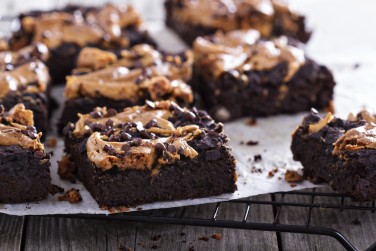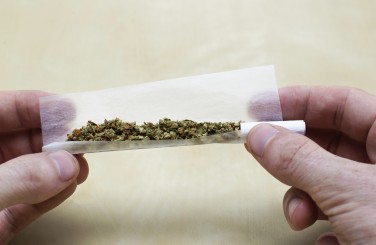What You Never Knew About Smoking Weed (Until Now)
Roll it, pack it, bake it, vape it… when it comes to marijuana, the options are (almost) endless—and so are the myths that surround it. As the conversation of legalization gains momentum, we continue to see the same theories trotted out. Though we’re neither pro nor con when it comes to cannabis, we do want to sort fact from fiction and know all the health effects. With that in mind, we've rounded up eight of the most popular pot myths so we can set the record straight.
1. Myth: Using a vaporizer is the healthiest way to use marijuana.
Fact: Though using a vaporizer doesn’t involve inhaling smoke (yay, no carcinogens!), it’s unclear whether it’s actually better for you than toking a joint. Because a vaporizer involves exposure to little or no less-than-stellar byproducts, some studies suggest it may be a healthier route, and certain health experts agree. However recent research implies that more scientific study is needed to know for sure whether or not vaping is the best bet.
Fact: Though using a vaporizer doesn’t involve inhaling smoke (yay, no carcinogens!), it’s unclear whether it’s actually better for you than toking a joint. Because a vaporizer involves exposure to little or no less-than-stellar byproducts, some studies suggest it may be a healthier route, and certain health experts agree. However recent research implies that more scientific study is needed to know for sure whether or not vaping is the best bet.
2. Myth: Edibles give you a stronger high.
Fact: Taking a hit results in getting stoned faster, but those hash brownies and any other form of edible marijuana results in a longer lasting, different kind of high—just not necessarily stronger. When you ingest THC, it’s metabolized by the liver and ends up having a more psychedelic effect than smoked THC. Plus, you’ll feel the effects about an hour or two after you’ve gobbled up those baked goodies, and they can last anywhere from 6 to 10 hours, a much longer lifespan than smoked marijuana. It’s also worth noting that the effects of edibles can depend on whether or not you’ve eaten and what other medications are in your system—just a few things to consider if you’re contemplating a recipe from the Alice B. Toklas cookbook.
3. Myth: Mary Jane makes you dumb and lazy.
Fact: The “stoner kid” character in high school movies or TV shows is stereotypically not the brightest bulb or the most motivated student (though they’re often the funniest). But that’s an unfair generalization, considering each person—and his or her high—is unique and dependent on weed’s potency, frequency of use, and the smoker’s age. Bearing that in mind, there is some research that supports the fact that intelligence may take a hit due to marijuana use. One studyfinds that persistent use—particularly in those who started in their teens—is associated with a decline in IQ. Other research suggests smoking marijuana heavily during teen years could cause changes in brain structure, specifically the parts related to working memory, and could lead to poor performance on memory tasks. The kicker? These effects were seen a few years after the participants had stopped smoking, suggesting there may be long-term risks related to toking up. Yet another study suggests that even light to moderate marijuana use could elicit abnormalities in the brain, particularly in the areas that have to do with emotion and reward processing.
Fact: The “stoner kid” character in high school movies or TV shows is stereotypically not the brightest bulb or the most motivated student (though they’re often the funniest). But that’s an unfair generalization, considering each person—and his or her high—is unique and dependent on weed’s potency, frequency of use, and the smoker’s age. Bearing that in mind, there is some research that supports the fact that intelligence may take a hit due to marijuana use. One studyfinds that persistent use—particularly in those who started in their teens—is associated with a decline in IQ. Other research suggests smoking marijuana heavily during teen years could cause changes in brain structure, specifically the parts related to working memory, and could lead to poor performance on memory tasks. The kicker? These effects were seen a few years after the participants had stopped smoking, suggesting there may be long-term risks related to toking up. Yet another study suggests that even light to moderate marijuana use could elicit abnormalities in the brain, particularly in the areas that have to do with emotion and reward processing.
As far as laziness goes, research suggests that lighting up leads to compromised dopamine production, usually triggered when you’ve achieved something. Less of this feel-good chemical means less achievement-based happiness, which could bring out a slacker attitude. So sorry, guys and gals. There may be a (scientifically-supported) kernel of truth to this one—though researchers are calling for a more in-depth look into how pot affects the brain.
4. Myth: Pot is safer than alcohol and/or tobacco.
Fact: Compared to alcohol, marijuana isn’t actually terribly harmful, and smoking it is less risky than smoking tobacco. Plus, there’s no distinct connection between weed and a deadly disease, and it also hasn’t been found to lead to a life-threatening overdose. One thing to note, however: a recent study that focused on fatal car accidents in Colorado (one of the two states in which pot is completely legal) found an increase in incidents involving drivers who tested positive for the drug since medical marijuana was commercialized in 2009. It’s no secret that weed, as with any drug, impairs you, so in that circumstance it can be just as hazardous. Lesson: Don’t toke and drive.
Fact: Compared to alcohol, marijuana isn’t actually terribly harmful, and smoking it is less risky than smoking tobacco. Plus, there’s no distinct connection between weed and a deadly disease, and it also hasn’t been found to lead to a life-threatening overdose. One thing to note, however: a recent study that focused on fatal car accidents in Colorado (one of the two states in which pot is completely legal) found an increase in incidents involving drivers who tested positive for the drug since medical marijuana was commercialized in 2009. It’s no secret that weed, as with any drug, impairs you, so in that circumstance it can be just as hazardous. Lesson: Don’t toke and drive.
5. Myth: Marijuana is not addictive.
Fact: Though some say it’s rare to be dependent on marijuana, and its dependency rates are lower than those associated withother substances, studies and data do support claims that youcan get hooked on weed. In fact, those trying to drop the habit report withdrawal symptoms (though they’re nowhere near as bad as those associated with harder drugs,like heroin), like anxiety, irritability, and even aggression.
6. Myth: Marijuana can help improve and/or treat certain health issues, such as glaucoma and multiple sclerosis.
Fact: Bud may, in fact, be beneficial to those who suffer from certain diseases—but there may be a catch in a lot of cases. A synthetic version of THC, which is found in an FDA-approved drug called Marinol, is known to help lessen nausea in patients undergoing chemotherapy as well as boost appetite in those living with AIDS.One study in mice also suggests that some of the chemicals found in marijuana can help prevent spinal cord and brain inflammation, which may help treat multiple sclerosis and similar inflammatory diseases. While smoking some weed has been found to lower IOP (intraocular pressure, which is one of the saboteurs behind glaucoma-related nerve damage in the eyes), it only has this beneficial effect for a few hours, which would mean having to smoke the stuff pretty heavily. The problem? Smoking that much MJ would impair you to the point where you wouldn’t even be able to drive. To top it off, smoking also lowers blood pressure, which could inhibit blood flow to your eyes—not a good thing for those with glaucoma.
Fact: Bud may, in fact, be beneficial to those who suffer from certain diseases—but there may be a catch in a lot of cases. A synthetic version of THC, which is found in an FDA-approved drug called Marinol, is known to help lessen nausea in patients undergoing chemotherapy as well as boost appetite in those living with AIDS.One study in mice also suggests that some of the chemicals found in marijuana can help prevent spinal cord and brain inflammation, which may help treat multiple sclerosis and similar inflammatory diseases. While smoking some weed has been found to lower IOP (intraocular pressure, which is one of the saboteurs behind glaucoma-related nerve damage in the eyes), it only has this beneficial effect for a few hours, which would mean having to smoke the stuff pretty heavily. The problem? Smoking that much MJ would impair you to the point where you wouldn’t even be able to drive. To top it off, smoking also lowers blood pressure, which could inhibit blood flow to your eyes—not a good thing for those with glaucoma.
Though there are medical benefits to toking up, there are also some definite drawbacks (apart from the ones we’ve already listed). If you’re smoking weed, you’re also introducing gunk into yourrespiratory system. Plus, marijuana use been linked to sleep troubles, and recent research suggests reaching for some Mary Jane is related to heart attacks and even death
The bottom line: Sure, weed can help mitigate certain symptoms and offer pain relief, but, as with any drug, it comes with its own set of side effects and possible risks.
7. Myth: Weed is a gateway drug.
Fact: This is the mother of all Mary Jane myths. And like legalization itself, the debate as to whether or not toking up leads to harder drugs rages on—and the evidence is as hazy as the high. While anti-drug organizations say that people who smoke pot may indeed later turn to more hazardous substances (including nicotine and cocaine), they also acknowledge that’s not always the case. Research showsthat kids who go for ganja are 85 times more likely to try cocaine (though it’s worth noting that this link exists in children who drink alcohol and smoke cigarettes too—just at a lower likelihood). That said, smoking marijuana isn’t necessarily the cause of harder drug use. The possible culprits may have more to do with the desire to pursue mind-altering substances, stress, and economic backgroundthan actually smoking pot.
Fact: This is the mother of all Mary Jane myths. And like legalization itself, the debate as to whether or not toking up leads to harder drugs rages on—and the evidence is as hazy as the high. While anti-drug organizations say that people who smoke pot may indeed later turn to more hazardous substances (including nicotine and cocaine), they also acknowledge that’s not always the case. Research showsthat kids who go for ganja are 85 times more likely to try cocaine (though it’s worth noting that this link exists in children who drink alcohol and smoke cigarettes too—just at a lower likelihood). That said, smoking marijuana isn’t necessarily the cause of harder drug use. The possible culprits may have more to do with the desire to pursue mind-altering substances, stress, and economic backgroundthan actually smoking pot.
8. Myth: Marijuana helps you mellow out.
Fact: Despite the fact that the green stuff can help you relax, sometimes it has the exact opposite effect. And there’s actuallyplenty of science to back this up. Depending on the person, puffs can lead to a little paranoia and anxiety.
Fact: Despite the fact that the green stuff can help you relax, sometimes it has the exact opposite effect. And there’s actuallyplenty of science to back this up. Depending on the person, puffs can lead to a little paranoia and anxiety.



No comments:
Post a Comment